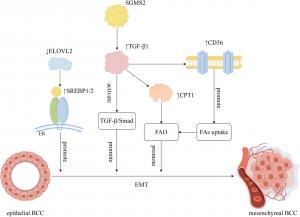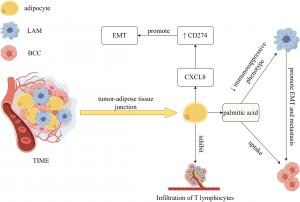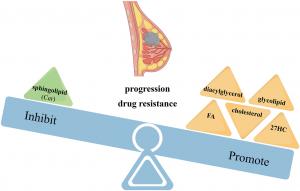The Role of Lipid Metabolism in Breast Cancer Progression and Treatment Resistance

Dysregulation of lipid metabolism promotes EMT (by Figdraw). Down-regulation of ELOVL2 promotes EMT in breast cancer by up-regulating expression of SREBP1/2.
SHANNON, CLARE, IRELAND, April 20, 2025 /EINPresswire.com/ --
Lipid metabolism has emerged as a central player in the progression and therapy resistance of breast cancer, particularly the aggressive subtype known as triple-negative breast cancer (TNBC). This review article highlights how disruptions in lipid regulation can significantly influence the behavior of breast cancer cells, impacting their growth, metastasis, and response to treatment.
Alterations in the metabolism of fatty acids, cholesterol, sphingolipids, and glycolipids are profoundly intertwined with breast cancer cell survival and invasiveness. The uptake and biosynthesis of fatty acids are notably upregulated in tumor cells, which not only fuels cellular energy demands but also supports membrane synthesis and intracellular signaling. Key enzymes and transporters, such as CD36, FASN, and FABP4, are instrumental in facilitating this metabolic shift, thereby enhancing tumor proliferation and metastatic potential.
In cholesterol metabolism, the focus falls on how elevated cholesterol synthesis and its potent metabolite 27-hydroxycholesterol (27HC) accelerate tumor progression and interfere with immune responses. Proteins such as SREBP2, NSDHL, and STARD4 further contribute to this dysregulation, reinforcing cancer cell survival and dissemination. The interplay of 27HC with estrogen receptors and immune-modulatory pathways further complicates therapeutic strategies, particularly in hormone-sensitive and resistant tumors.
The dual nature of sphingolipid metabolism, especially the contrasting roles of ceramide and its glycosylated derivatives, underscores a complex metabolic paradox. While ceramide accumulation exhibits tumor-suppressive effects, including enhanced apoptosis and chemotherapy sensitization, glycosylated forms such as Globo-H ceramide and GD2 are linked to tumorigenesis, angiogenesis, and cancer stem cell maintenance.
A crucial outcome of lipid reprogramming is its role in promoting epithelial-mesenchymal transition (EMT), a process associated with enhanced migratory ability and drug resistance. Factors like ELOVL2, SGMS2, and CXCL8 modulate EMT through intricate signaling cascades, including TGF-β, PI3K/AKT, and SREBP1/2 axes.
Beyond intrinsic cancer cell metabolism, the surrounding tumor immune microenvironment (TIME) also adapts in response to lipid cues. M2 macrophages, cancer-associated fibroblasts, and CD8+ T cells exhibit lipid-driven phenotypic shifts that support tumor evasion and therapy failure.
Resistance to standard treatments—including chemotherapy, endocrine therapy, HER2-targeted therapy, and immune checkpoint inhibitors—is intimately linked to lipid metabolic rewiring. Upregulation of CD36, FASN, CPT1, and GPR120 exemplifies how tumor cells exploit lipid pathways to avoid apoptosis, reduce drug accumulation, and sustain stemness.
# # # # #
Genes & Diseases publishes rigorously peer-reviewed and high quality original articles and authoritative reviews that focus on the molecular bases of human diseases. Emphasis is placed on hypothesis-driven, mechanistic studies relevant to pathogenesis and/or experimental therapeutics of human diseases. The journal has worldwide authorship, and a broad scope in basic and translational biomedical research of molecular biology, molecular genetics, and cell biology, including but not limited to cell proliferation and apoptosis, signal transduction, stem cell biology, developmental biology, gene regulation and epigenetics, cancer biology, immunity and infection, neuroscience, disease-specific animal models, gene and cell-based therapies, and regenerative medicine.
Scopus CiteScore: 7.3
Impact Factor: 6.9
# # # # # #
More information: https://www.keaipublishing.com/en/journals/genes-and-diseases/
Editorial Board: https://www.keaipublishing.com/en/journals/genes-and-diseases/editorial-board/
All issues and articles in press are available online in ScienceDirect (https://www.sciencedirect.com/journal/genes-and-diseases ).
Submissions to Genes & Disease may be made using Editorial Manager (https://www.editorialmanager.com/gendis/default.aspx ).
Print ISSN: 2352-4820
eISSN: 2352-3042
CN: 50-1221/R
Contact Us: editor@genesndiseases.com
X (formerly Twitter): @GenesNDiseases (https://x.com/GenesNDiseases )
# # # # # #
Reference
Wenxiang Fu, Aijun Sun, Huijuan Dai, Lipid metabolism involved in progression and drug resistance of breast cancer, Genes & Diseases, Volume 12, Issue 4, 2025, 101376, https://doi.org/10.1016/j.gendis.2024.101376
Funding Information:
National Natural Science Foundation of China 82303865
Science and Technology Commission of Huaian Municipality, Jiangsu, China HAB202209
Genes & Diseases Editorial Office
Genes & Diseases
+86 23 6571 4691
editor|genesndiseases.com| |editor|genesndiseases.com
Legal Disclaimer:
EIN Presswire provides this news content "as is" without warranty of any kind. We do not accept any responsibility or liability for the accuracy, content, images, videos, licenses, completeness, legality, or reliability of the information contained in this article. If you have any complaints or copyright issues related to this article, kindly contact the author above.
Massachusetts School of Law Welcomes Prospective Students to Open House on May 7th
State Controller Malia Cohen to Speak at 2025 Regional Economic Outlook
Woodrow Wilson House Exhibition & Gala: Fashioning Power, Fashioning Peace
Kalendarium
Więcej ważnych informacji
 Jedynka Newserii
Jedynka Newserii

 Jedynka Newserii
Jedynka Newserii

Prawo

UE lepiej przygotowana na reagowanie na klęski żywiołowe. Od czasu powodzi w Polsce pojawiło się wiele usprawnień
Na tereny dotknięte ubiegłoroczną powodzią od rządu trafiło ponad 4 mld zł. Pierwsze formy wsparcia, w tym zasiłki, pomoc materialna czy wsparcie dla przedsiębiorców, pojawiły się już w pierwszych dniach od wystąpienia kataklizmu. Do Polski ma też trafić 5 mld euro z Funduszu Spójności UE na likwidację skutków powodzi. Doświadczenia ostatnich lat powodują, że UE jest coraz lepiej przygotowana, by elastycznie reagować na występujące klęski żywiołowe.
Prawo
Rzecznik MŚP: Obniżenie składki zdrowotnej to nie jest szczyt marzeń. Ideałem byłby powrót do tego, co było przed Polskim Ładem

Podczas najbliższego posiedzenia, które odbędzie się 23 i 24 kwietnia, Senat ma się zająć ustawą o świadczeniach opieki zdrowotnej finansowanych ze środków publicznych. Zakłada ona korzystne zmiany w składkach zdrowotnych płaconych przez przedsiębiorców. Rzecznik MŚP apeluje do izby wyższej i prezydenta o przyjęcie i podpisanie nowych przepisów. Pojawiają się jednak głosy, że uprzywilejowują one właścicieli firm względem pracowników, a ponadto nie podlegały uzgodnieniom, konsultacjom i opiniowaniu.
Handel
Konsumpcja jaj w Polsce rośnie. Przy zakupie Polacy zwracają uwagę na to, z jakiego chowu pochodzą

Zarówno spożycie, jak i produkcja jaj w Polsce notują wzrosty. Znacząca większość konsumentów przy zakupie jajek zwraca uwagę na to, czy pochodzą one z chowu klatkowego. Polska jest jednym z liderów w produkcji i eksporcie jajek w UE, ale ma też wśród nich największy udział kur w chowie klatkowym. Oczekiwania konsumentów przyczyniają się powoli do zmiany tych statystyk.
Partner serwisu
Szkolenia

Akademia Newserii
Akademia Newserii to projekt, w ramach którego najlepsi polscy dziennikarze biznesowi, giełdowi oraz lifestylowi, a także szkoleniowcy z wieloletnim doświadczeniem dzielą się swoją wiedzą nt. pracy z mediami.




![Dramatyczna sytuacja w opiece długoterminowej. Kolejki oczekujących są coraz dłuższe [DEPESZA]](https://www.newseria.pl/files/1097841585/opieka-nfz-still-1,w_85,_small.jpg)





.gif)

 |
| |
| |
|